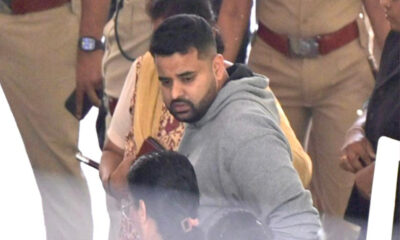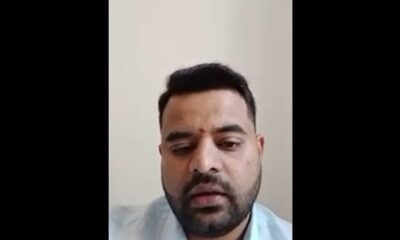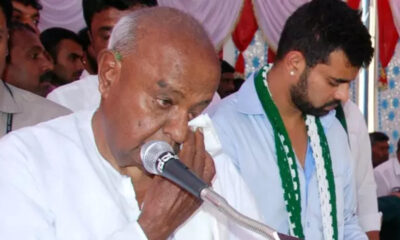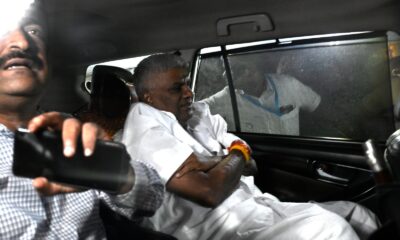india
MLC Suraj Revanna Arrested for Sexual Abuse, Remanded for 14 Days
MLC Suraj Revanna has been arrested on charges of sexually abusing a 27-year-old man in Hassan.
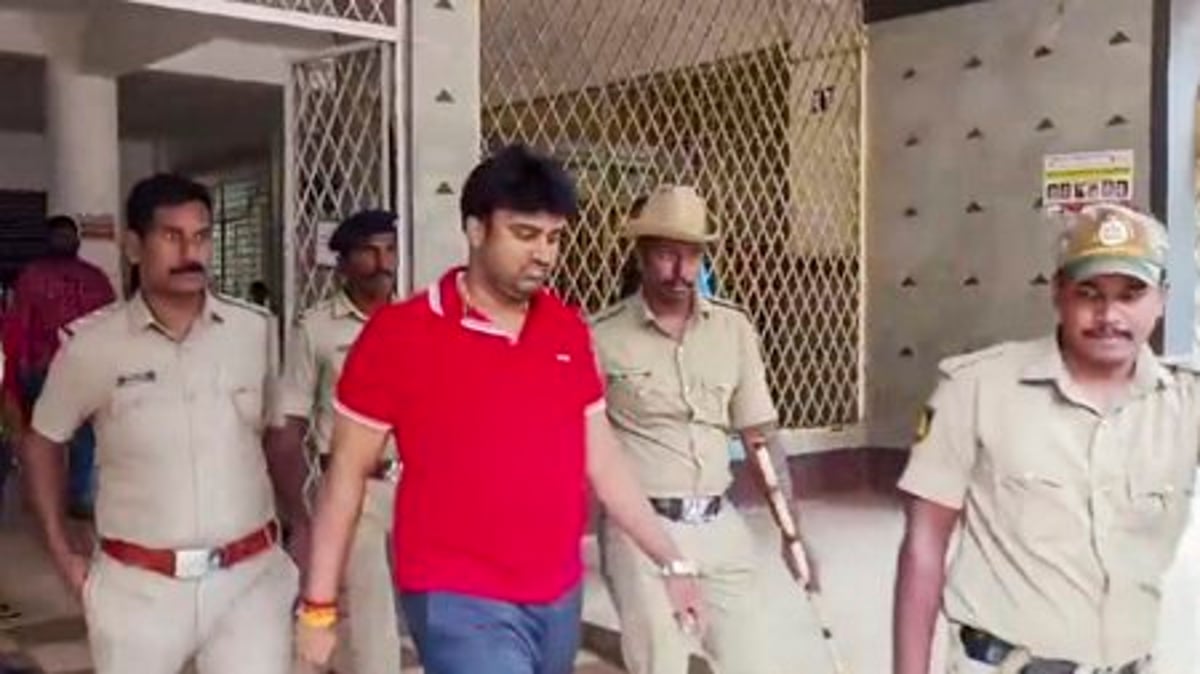
MLC Suraj Revanna, a member of the Janata Dal (Secular) party, has been arrested following allegations of sexually abusing a 27-year-old man in Hassan district. The incident, which has shocked the local community, has drawn widespread media attention due to the high-profile nature of the accused, who is the grandson of former Prime Minister H D Deve Gowda. The case has now been handed over to the Criminal Investigation Department (CID) for further investigation.
MLC Suraj Revanna
The arrest followed a complaint lodged by the victim, a young man from Arkalgud taluk in Hassan district. The victim alleged that Suraj Revanna, the eldest son of Holenarasipura MLA H D Revanna, sexually abused him at his farmhouse in Ghannikada on June 16. According to the complaint, Suraj promised the young man a job as a way to lure him to the farmhouse, where the alleged abuse took place. The victim reported the incident to the Holenarasipura police, who registered a case under various sections of the Indian Penal Code (IPC), including Section 377 (unnatural offences), Section 342 (wrongful confinement), and Section 506 (criminal intimidation).
Following the registration of the complaint, Suraj Revanna was apprehended and initially held in Hassan. However, the investigation was quickly transferred to the CID, a move that is often made in high-profile cases to ensure a thorough and impartial investigation. Suraj was then transferred to Bengaluru, where he was produced before the 42nd Additional Chief Metropolitan Magistrate Court (ACMM) judge at the judge’s residence. The magistrate remanded Suraj in judicial custody for 14 days.
Suraj Revanna has vehemently denied the allegations against him, claiming that the complaint is part of an extortion attempt. He has accused the victim of filing a false complaint in an effort to extort Rs 5 crore from him. This counter-claim has added another layer of complexity to the case, as it suggests that there may be more at play than initially meets the eye.
The allegations against Suraj have sent shockwaves through the political community, particularly within the Janata Dal (Secular) party. As a prominent political figure and the grandson of a former Prime Minister, Suraj’s arrest has garnered significant media coverage. The case also highlights the ongoing issues of power dynamics and abuse within Indian politics, a subject that has been the focus of much public and media scrutiny in recent years.
The judicial proceedings and the CID’s investigation will be closely watched by the public and media alike. Cases involving high-profile individuals often attract intense scrutiny, not only because of the individuals involved but also because of the broader implications for justice and accountability within the political system. The outcome of this case could have significant repercussions, both for Suraj Revanna personally and for the political landscape in Karnataka.
As the case progresses, it is essential to ensure that the investigation is conducted impartially and that all parties involved are given a fair hearing. The CID’s involvement is a positive step in this direction, as it brings a level of expertise and impartiality that is crucial in high-stakes cases such as this. Additionally, it is vital for the judicial system to uphold the principles of justice and ensure that any decision made is based on a thorough and fair examination of the evidence.
The allegations against Suraj Revanna are serious and have the potential to significantly impact his political career and personal life. For now, he remains in judicial custody, and the CID’s investigation continues. The coming weeks will be critical in determining the course of this case and its eventual outcome.
india
How Trump’s Tariffs Are Unexpectedly Strengthening India-China Ties
In a surprising twist, the latest wave of tariffs imposed by U.S. President Donald Trump is bringing India and China closer together, reshaping their economic relationship amid global trade tensions. As of April 9, 2025, Trump’s aggressive tariff hike—pushing duties on Chinese goods to a staggering 104%—has sent shockwaves through international markets. But rather than […]

In a surprising twist, the latest wave of tariffs imposed by U.S. President Donald Trump is bringing India and China closer together, reshaping their economic relationship amid global trade tensions. As of April 9, 2025, Trump’s aggressive tariff hike—pushing duties on Chinese goods to a staggering 104%—has sent shockwaves through international markets. But rather than driving a wedge between the two Asian giants, this move is fostering an unlikely partnership that could redefine their future.
A New Alliance Takes Shape
With the U.S. slapping hefty tariffs on Chinese imports, Beijing is feeling the heat, prompting a strategic pivot toward its neighbors. India, long seen as a competitor, is emerging as a key ally. Experts suggest that China’s need to diversify its export markets has opened doors for collaboration with India. From shared manufacturing ventures to joint efforts in technology and pharmaceuticals, the two nations are finding common ground. “This isn’t just about survival—it’s about building a stronger economic bloc,” says a trade analyst familiar with the shift.
Why Now?
The timing couldn’t be more critical. Trump’s tariff escalation, effective from midnight on April 9, has left China scrambling to offset losses. With the U.S. market becoming less accessible, China is turning to India’s growing consumer base and industrial capacity. Meanwhile, India sees an opportunity to boost its own economy by partnering with China, rather than competing head-on. This mutual benefit is sparking discussions about long-term trade agreements that could rival Western dominance.
The Human Impact
For everyday people, this shift means more than just trade stats. In cities like Mumbai and Shanghai, small businesses are already feeling the ripple effects. Indian textile makers are teaming up with Chinese suppliers to cut costs, while Chinese tech firms are exploring India’s skilled workforce to set up new hubs. Families in both countries might soon see cheaper goods and more job opportunities, though some worry about the risks of over-reliance on this newfound partnership.
Challenges Ahead
Of course, it’s not all smooth sailing. Historical tensions and border disputes between India and China linger, casting a shadow over this budding alliance. Critics argue that economic cooperation could strain if political differences flare up again. Still, the current economic pressure from Trump’s policies seems to be outweighing these concerns—for now. Both nations are cautiously optimistic, with leaders hinting at high-level talks to solidify their plans.
A Global Game-Changer?
This evolving India-China relationship could have far-reaching implications. As the U.S. doubles down on protectionism, the two Asian powers might lead a charge toward a new trade order. Whether this partnership holds strong or crumbles under pressure, one thing is clear: Trump’s tariffs are pushing India and China to rethink their strategies—and their rivalry. Keep an eye on this developing story, as it could reshape the global economy in ways we’re only beginning to understand.
Karnataka
Shocking Revelation: 72% of Bottled Water in Karnataka Deemed Unsafe or Substandard
Imagine reaching for a refreshing bottle of water, trusting it’s safe to drink, only to find out it might be hiding harmful contaminants. That’s the unsettling reality uncovered in Karnataka, where a recent investigation by the state’s Food Safety and Drug Administration has exposed serious concerns about the quality of bottled water. In a special […]
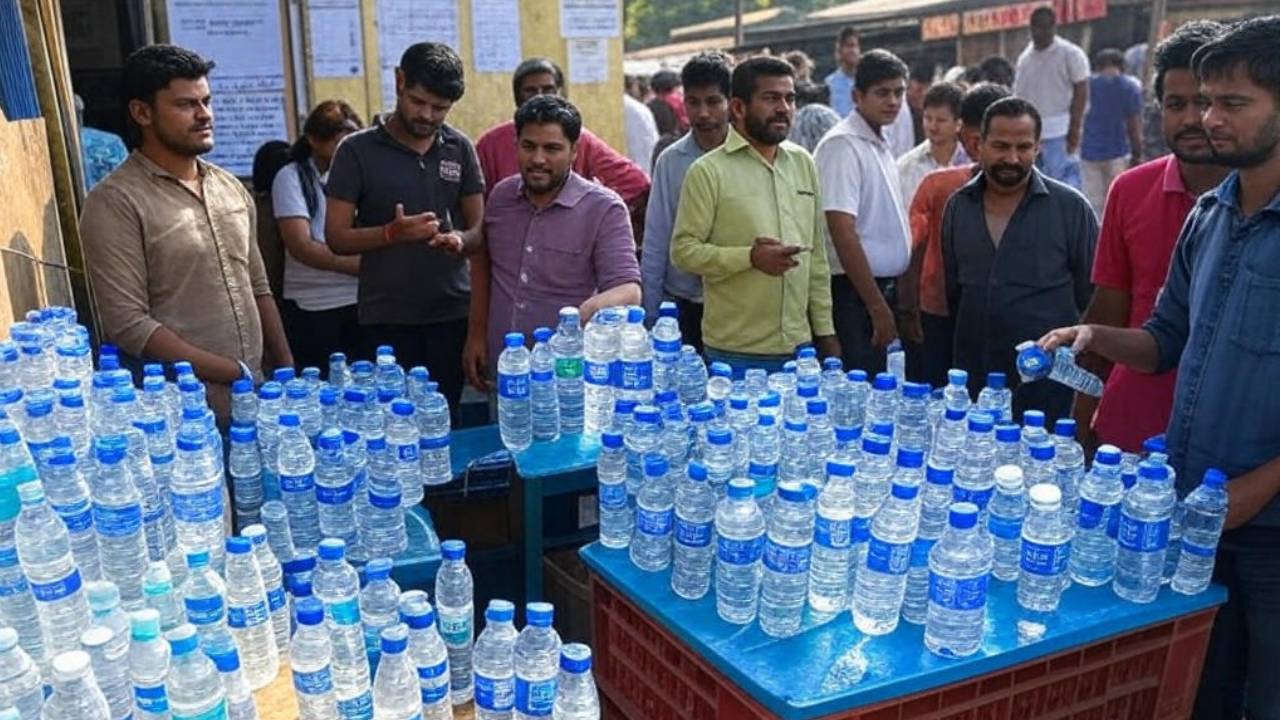
Imagine reaching for a refreshing bottle of water, trusting it’s safe to drink, only to find out it might be hiding harmful contaminants. That’s the unsettling reality uncovered in Karnataka, where a recent investigation by the state’s Food Safety and Drug Administration has exposed serious concerns about the quality of bottled water. In a special campaign launched in February 2025, officials collected 296 samples from across the region. Of the 255 samples analyzed so far, a staggering 72%—or 183 bottles—were flagged as either unsafe or of poor quality. This alarming statistic has left residents questioning the safety of a basic necessity they rely on every day.
The Numbers Tell a Worrying Story
Out of the tested samples, only 72 were deemed safe for consumption. Meanwhile, 95 bottles failed safety standards due to dangerous chemical or microbial contamination, posing real health risks. An additional 88 samples didn’t quite meet the mark either, classified as substandard because of low mineral content or other quality issues. With analysis still underway for the remaining samples, the full scope of the problem could grow even larger. Karnataka’s Health and Family Welfare Minister, Dinesh Gundu Rao, didn’t mince words when he shared the findings with the press, calling the situation “deeply concerning” and “unacceptable.”
What’s Lurking in Your Water?
So, what exactly is tainting these bottles? According to the minister, the unsafe samples contained a mix of chemical pollutants like pesticide residues, fluoride, and excessive levels of total dissolved solids (think calcium and magnesium). On top of that, microbial contamination—such as bacteria—was detected, adding another layer of risk. Even the substandard samples, while not immediately hazardous, fell short of expectations due to insufficient minerals, which could still affect long-term health. It’s a wake-up call that not all bottled water is as pure as the labels might suggest.
Cracking Down on Culprits
The state isn’t sitting idle. The Food Safety and Drug Administration is gearing up to take action, starting with collecting legal samples from bottled water companies. Once the evidence is in hand, they plan to file cases against manufacturers found guilty of supplying subpar or dangerous products. “We’ve only taken survey samples so far,” Minister Rao explained. “But now, we’re moving to legal samples to hold these companies accountable.” This step signals a broader push to clean up the industry and protect public health.
Beyond Water: A Wider Food Safety Mission
This bottled water scandal is just one piece of a larger effort by Karnataka’s health officials. In March alone, they analyzed over 3,200 food samples, including paneer and ghee, to root out unsafe products. For instance, out of 32 tested paneer samples, two were unsafe, while six out of 49 ghee samples met safety standards so far. The state’s mission? To ensure that everything from your drinking water to your daily snacks meets the highest quality benchmarks.
What This Means for You
For Karnataka residents—and anyone who trusts bottled water—this news is a stark reminder to stay vigilant. While the affected brands haven’t been publicly named yet, the minister hinted that some well-known names might be involved. Until more details emerge, it’s worth double-checking the source of your water and keeping an eye out for updates from the authorities. After all, when it comes to something as essential as water, you deserve to know it’s safe to sip.
A Call for Change
Minister Rao emphasized that this isn’t just about punishment—it’s about prevention. “Our goal is to raise awareness and improve food production quality,” he said. By cracking down on violators and educating the public, Karnataka’s health department hopes to turn the tide on this troubling trend. For now, though, the message is clear: that bottle of water in your hand might not be as trustworthy as you think. Stay informed, stay cautious, and let’s hope for cleaner, safer options on the shelves soon.
india
Tahawwur Rana Extradited to India: NIA Prepares to Take Custody After US Supreme Court Ruling
In a significant victory for justice, Tahawwur Rana, a key figure linked to the 2008 Mumbai terror attacks, is set to arrive in India on Wednesday, April 9, 2025. The US Supreme Court’s recent rejection of his plea to halt extradition has paved the way for the National Investigation Agency (NIA) to take him into

In a significant victory for justice, Tahawwur Rana, a key figure linked to the 2008 Mumbai terror attacks, is set to arrive in India on Wednesday, April 9, 2025. The US Supreme Court’s recent rejection of his plea to halt extradition has paved the way for the National Investigation Agency (NIA) to take him into custody. This long-awaited moment marks a crucial step in holding the Pakistani-Canadian, associated with the Lashkar-e-Taiba (LeT) terrorist group, accountable for his alleged role in the devastating attacks that claimed 157 lives.
A Long Journey to Justice
Tahawwur Rana’s extradition journey has been a roller coaster of legal battles. After exhausting all appeals in the US, including a final plea to Chief Justice John Roberts, the Supreme Court denied his request on Monday. Rana, who had cited fears of torture based on a UK case, argued against his extradition, but the court stood firm. His arrival is expected in Mumbai, the very city where the 26/11 attacks unfolded, though Delhi remains a possibility. Sources suggest he’ll spend his initial weeks under NIA supervision as investigations deepen.
Rana’s connection to the Mumbai attacks stems from his collaboration with David Coleman Headley, a Pakistani-American convicted for scouting targets. Although acquitted in the US of directly supporting the attacks, Rana was found guilty on other charges, serving over a decade in prison. His release was halted when India requested his extradition, a move endorsed by President Donald Trump during a February meeting with Prime Minister Narendra Modi.
What Happens Next?
As Rana touches down, the NIA is gearing up to question him at its headquarters, likely in Delhi, with heightened security measures in place. This could shed new light on the broader conspiracy behind the attacks. The agency has been relentless, filing charges against Rana and eight others in 2011, and his presence in India now allows the legal process to move forward after years of delays.
The public is buzzing with mixed emotions—relief that a key suspect is finally facing justice, but also curiosity about what his testimony might reveal. Families of the victims, still grappling with the pain of that tragic night, see this as a step toward closure, though many wonder if the full truth will ever surface.
A Turning Point in India-US Cooperation
This extradition highlights the strengthening bond between India and the US in combating terrorism. Trump’s announcement and the coordinated efforts of the NIA and US authorities underscore a shared commitment to bringing perpetrators to justice. As the case unfolds, it could set a precedent for future international collaborations against terror networks.
-

 india2 years ago
india2 years ago“Major Crash of Sukhoi Su-30 and Mirage 2000 Fighter Jets in Madhya Pradesh”
-

 Sports2 years ago
Sports2 years agoWFI meetings on April 16, elections likely to be discussed
-

 india1 year ago
india1 year agoPM Modi Meets Deve Gowda for Seat Sharing Talks
-

 india1 year ago
india1 year agoBengaluru: False threat to bomb Raj Bhavan
-

 india2 years ago
india2 years ago“AIMIM to Contest 50 Seats in Upcoming Telangana Assembly Elections”
-

 Entertainment1 year ago
Entertainment1 year agoAnant Ambani: Controversy at the Ambani Pre-Wedding Bash
-

 Entertainment2 years ago
Entertainment2 years agoRajinikanth is Moideen Bhai in ‘Lal Salaam’
-

 Videos2 years ago
Videos2 years agoBidar News : Press Meet Organized By Zilla Kannada Sahitya Parishad

